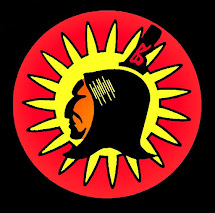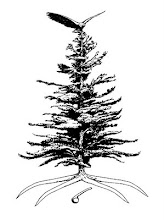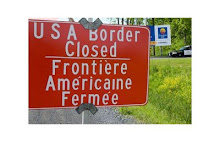Tuesday, July 17, 2012
Senecas Clash With Police Over Tax Ruling (July 17, 1992)
A tax war between Seneca Indians and New York State grew more divisive today as Indians dropped burning tires off a highway overpass and clashed with state police.
Thirteen protesters were arrested and at least four state troopers were injured, including the force's commander in western New York.
About 200 Indians began burning tires and other debris about 7 P.M. Wednesday to protest taxes the state wants to impose on the sale of gasoline and cigarettes at reservations.
About midnight, protesters started throwing burning debris from an overpass onto the Gov. Thomas E. Dewey Thruway, which borders the Cattaraugus Indian Reservation 30 miles southwest of Buffalo. 30-Mile Stretch Closed
State troopers in riot gear cleared protesters from the overpass and put out the fire, said Maj. George Meyer. Thirteen protesters were arrested.
Troopers closed a 30-mile stretch of the Thruway around the reservation when the confrontation began. The highway reopened at 6 A.M. today.
During the protest, Maj. Bruce Roloff, commander of Troop A in western New York, was hit in the head with a two-by-four, Major Meyer said. Major Roloff was listed in fair condition at Erie County Medical Center in Buffalo.
Three other troopers and three protesters were slightly injured when protesters drove cars into the crowd, the police said.
More than 200 extra troopers were sent to the reservation from around New York state today, said Sgt. Gregory Lang. Dozens of state police cars lined the Thruway near the reservation this afternoon, and troopers stopped and questioned drivers entering the reservation.
The protests were prompted by a ruling last week by the Appellate Division of State Supreme Court allowing New York to tax sales of gas and cigarettes to non-Indians on reservations.
Karl Felsen, a New York tax spokesman, said the state loses about $50 million a year because of tax-free sales of gas and cigarettes by Indians. Retailers near reservations say Indian vendors have an unfair advantage.
Centuries-old treaties prohibit taxing sales to Indians. But Indians say those treaties also apply to sales by Indian vendors to non-Indians.
Calvin John, the Seneca Nation president, said he would organize a committee to decide how to fight the tax ruling.
Robert Batson, deputy director of the state Indian relations office, said officials from his office also were in touch with Seneca leaders but could do little to control the violence.
"That's like the United Nations trying to control Sarajevo," Mr. Batson said.
Monday, July 2, 2012
Senator Maziarz Calls on the NYS Tax Commissioner to Put the State's Policy in Writing; Again!
June 27,2012
Commissioner Thomas H. Mattox
New York State Department of Taxation and Finance
Building 9, State Campus
Albany, New York 12227
Re: Native American Cigarettes
Dear Commissioner Mattox:
I write today as a follow-up to my May 16, 2011 letter regarding the collection of New York State Sales Tax on Native territories for the sale of tobacco products to individuals that are not Native American. To date, I have not received a response from your office to clarify the State's policy on this issue.
In the meantime, there have been other developments relating to Native American cigarettes that require further clarification from your office. For instance, the NYS Office of the Attorney General recently directed certain manufacturers of Native Brand cigarettes to cease and desist shipping, selling and distributing such brands in New York State (including on Native territories). The Attorney General's office cited the role of licensed stamping agents and required state excise taxes as the reason for the order.
The position of the attorney General's office seems to contradict a recent decision of the NYS Supreme Court in St. Lawrence County. The June 18, 2012 decision related to the taxability and seizure of Native American cigarettes that were made by a New York manufacturer and shipped out-of-state. In that decision, the judge rejected the contention that New York State tax laws only allow manufacturers of Native Brands to make out-of-state sales through a licensed agent so the taxes can be prepaid through the purchase of stamps.
In my view, the recent court case acknowledges that Native Brand cigarettes that are produced and sold on lands owned by Native Nations constitute commerce that is Native to Native. As such, these transactions cannot (and should not) be regulated or taxed by the State of New York. To do so would be contrary to the sovereign rights of the Native American Nations, and would have a significant negative impact on the Native retail economy.
Although the NYS Supreme Court case starts to provide some direction on the status of the taxation of Native American cigarettes, there is still much uncertainty in this area. Consequently, we request that you provide written clarification to us as soon as possible. It is critical that the citizens of New York and their elected representatives know the intention of your Department with regard to the collection of State taxes on Native Brand cigarettes and tobacco products.
I look forward to your timely reply and toward working with you to resolve these important issues.
Sincerely,
George D. Maziarz
Senator, 62nd District
Commissioner Thomas H. Mattox
New York State Department of Taxation and Finance
Building 9, State Campus
Albany, New York 12227
Re: Native American Cigarettes
Dear Commissioner Mattox:
I write today as a follow-up to my May 16, 2011 letter regarding the collection of New York State Sales Tax on Native territories for the sale of tobacco products to individuals that are not Native American. To date, I have not received a response from your office to clarify the State's policy on this issue.
In the meantime, there have been other developments relating to Native American cigarettes that require further clarification from your office. For instance, the NYS Office of the Attorney General recently directed certain manufacturers of Native Brand cigarettes to cease and desist shipping, selling and distributing such brands in New York State (including on Native territories). The Attorney General's office cited the role of licensed stamping agents and required state excise taxes as the reason for the order.
The position of the attorney General's office seems to contradict a recent decision of the NYS Supreme Court in St. Lawrence County. The June 18, 2012 decision related to the taxability and seizure of Native American cigarettes that were made by a New York manufacturer and shipped out-of-state. In that decision, the judge rejected the contention that New York State tax laws only allow manufacturers of Native Brands to make out-of-state sales through a licensed agent so the taxes can be prepaid through the purchase of stamps.
In my view, the recent court case acknowledges that Native Brand cigarettes that are produced and sold on lands owned by Native Nations constitute commerce that is Native to Native. As such, these transactions cannot (and should not) be regulated or taxed by the State of New York. To do so would be contrary to the sovereign rights of the Native American Nations, and would have a significant negative impact on the Native retail economy.
Although the NYS Supreme Court case starts to provide some direction on the status of the taxation of Native American cigarettes, there is still much uncertainty in this area. Consequently, we request that you provide written clarification to us as soon as possible. It is critical that the citizens of New York and their elected representatives know the intention of your Department with regard to the collection of State taxes on Native Brand cigarettes and tobacco products.
I look forward to your timely reply and toward working with you to resolve these important issues.
Sincerely,
George D. Maziarz
Senator, 62nd District
Subscribe to:
Comments (Atom)














![-[]-[]-/\-[]-[]-](https://blogger.googleusercontent.com/img/b/R29vZ2xl/AVvXsEjLoXmKO8PJVQ5pZ2q7GX7nFKw8H2tb28dxt-o10FUBNtOGszWhWoLB7tgjtMgtISpuSxNW3fcDxfuSS2DqojsdjNJ1lVggyUS374PnzsDbOhk4ukvtTunFQcyfkckZeBzcLbri4LDYN_E/s214/29-03-A-voice-from-the-Akw-.jpg)




